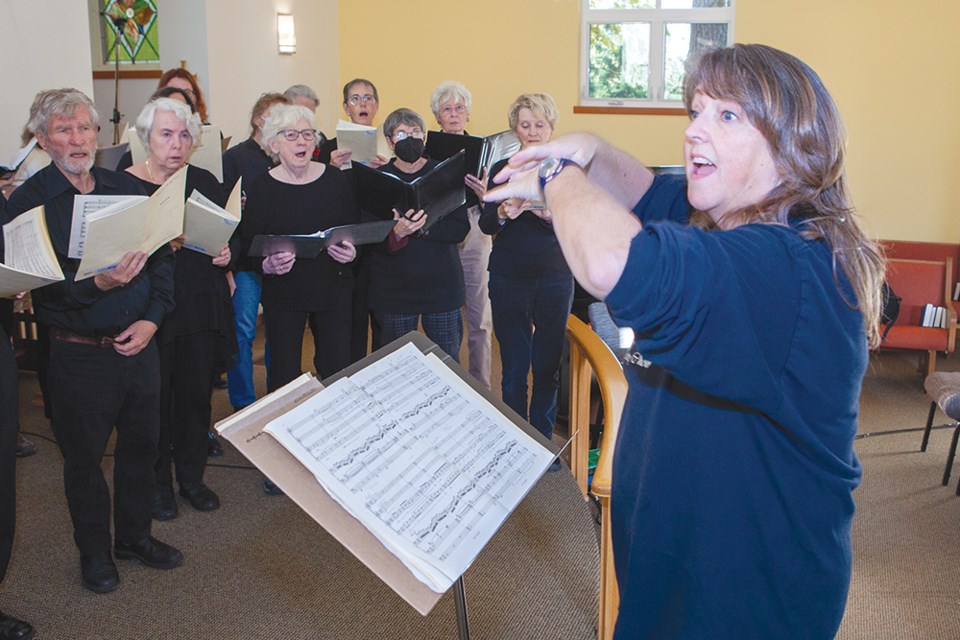The Sunshine Coast premiere of Maurice Duruflé’s Requiem, a choral masterpiece written 75 years ago, takes place this weekend in two performances at St. Hilda’s Anglican Church in Sechelt.
Director Sara Douglas supplemented her Suncoast Phoenix Community Choir with additional singers to build a corps of over 30 voices, which will be joined by guest soloists mezzo-soprano Maria Golas and bass-baritone Steven Price. Golas is a member of the Vancouver Chamber Choir. Price, who lives and performs in Victoria, is originally from Powell River.
“Initially, our singers were a little nervous,” said Douglas. “Some of them weren’t sure about this piece, but now that they know it, they just love it. It’s beautiful to listen to and it’s very challenging to sing. I’ve sung it many times, but I’ve never conducted it. Conducting it adds a whole new level of understanding and joy for me.”
The nine-movement work, structured according to the traditional Roman Catholic mass for the dead, is further shaped by musical influences from a thousand-year period stretching from the Early Middle Ages to the Second World War.
A year after Germany’s defeat of French forces in June 1940, Duruflé was commissioned by the authoritarian Vichy government to compose a symphonic poem. Duruflé decided instead to draw on ancient Gregorian plainsong chants to form the backbone of a choral requiem with instrumental accompaniment.
The piece was actually completed two years after the Allied victory in Europe. It premiered as part of a radio broadcast in November 1947 before public performances in Paris a month later.
“It certainly has a more tranquil, sombre sort of feeling,” said Douglas. “It doesn’t have the huge Deus Irae [movement] that the Mozart requiem does, or some of the other big requiems do. Yet it brings such a sense of peace to the listener and performer.”
Soprano Janet Oxley, who retired to the Sunshine Coast 10 years ago, has sung with choirs throughout her lifetime. When she was part of Montreal’s St. Lawrence Choir, the group travelled to New York City to perform Benjamin Britten’s War Requiem at Carnegie Hall. Yet the Duruflé work was unknown to her until Douglas selected it this year.
“I think the whole thing is just such an amazing piece of music,” said Oxley, “and I’m so excited to be working on it. Duruflé was a very serious scholar of 13th-century music, which was before music was counted in metre and written on pages. It was simply guidelines, based on the liturgy and breath and inspiration of the text. And somehow a few composers managed to set it down so that it survived.”
Tenor Sylvain Brochu is a section leader for the choir. He began singing in church chorales as a teenager in Quebec’s eastern townships and moved to the Sunshine Coast in 2001.
“The thing about this piece is that it uses different chords and melodies characteristic of contemporary music,” Brochu said. “And then it refers constantly to a Gregorian mood. That very interesting combination is what I think gives it a kind of austerity. With its emphasis on death, it’s sad and can be very dark, but then there are some absolutely unbelievable redeeming moments that make it all make sense.”
The Duruflé Requiem will be accompanied by David Poon on the St. Hilda’s pipe organ, cellist Sarah Poon, and additional string players.
Two performances of the 45-minute work take place on Saturday, Nov. 12 at St. Hilda’s Anglican Church (2 p.m. and 4 p.m.). Tickets ($25) are available at Strait Music in Sechelt.


.jpg;w=120;h=80;mode=crop)
